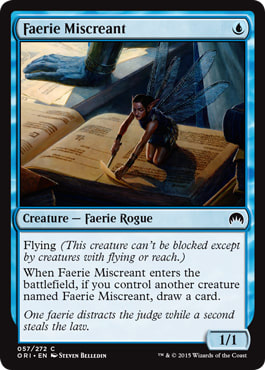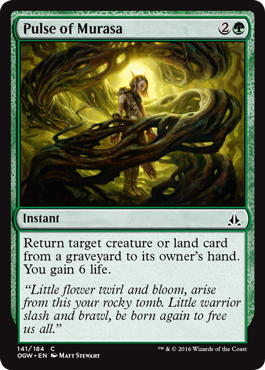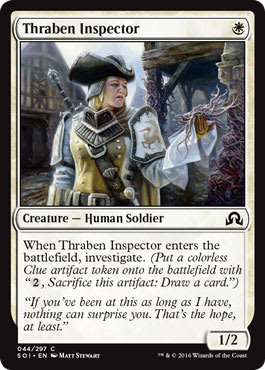My recent excursions with Thraben Inspector have helped to illuminate the value of a single card in Pauper. The format has a relatively flat power level, all things considered. While there are game-breaking spells, a la Rolling Thunder, the vast majority of cards that see play are able to generate smaller advantages. A Satyr Wayfinder is not that much different from a Sylvan Ranger, but depending on the deck, one is miles better, and yet, side by side, the power level is largely similar. The most emblematic deck for this tenet is Mono-Black Control, which has seemingly endless interchangeable 3-drops all designed to progress incrementally advance the caster’s card advantage. The effect of all these small gains is an eventual steamrolling of advantage.
Compare this to Mulldrifter or Deep Analysis. While the aforementioned cards are all two-for-ones, these two represent the long-vaunted three-for-one and yet are far harder to achieve. Deep Analysis is largely relegated to the sideboards of decks as a way to fight long-game attrition wars. Mulldrifter is among the best creatures available in the format, and even it sees play in a fraction of decks running Islands. The decks best set up to make use of Mulldrifter are those that can accelerate their mana quickly, like Tron. Jeskai Midrange has taken to the full four copies, but that deck succeeds when it can keep its opponent’s board in a state of development rather than dominance.
Jeskai Midrange ? Pauper | yawgz, 5?0, Pauper League, April 7
- Creatures (15)
- 1 Kor Sanctifiers
- 2 Lone Missionary
- 4 Glint Hawk
- 4 Kor Skyfisher
- 4 Mulldrifter
- Spells (22)
- 3 Lightning Bolt
- 4 Galvanic Blast
- 2 Firebolt
- 2 Kuldotha Rebirth
- 3 Journey to Nowhere
- 4 Ichor Wellspring
- 4 Prophetic Prism
- Lands (23)
- 1 Boros Garrison
- 1 Mortuary Mire
- 2 Azorius Chancery
- 2 Secluded Steppe
- 2 Tranquil Cove
- 3 Forgotten Cave
- 4 Swiftwater Cliffs
- 4 Ancient Den
- 4 Great Furnace
- Sideboard (15)
- 1 Kor Sanctifiers
- 1 Lone Missionary
- 1 Journey to Nowhere
- 1 Bojuka Bog
- 2 Electrickery
- 2 Gorilla Shaman
- 2 Hydroblast
- 3 Pyroblast
- 2 Standard Bearer
Tron ? Pauper | raptar1, 5?0, Pauper League, April 8
- Creatures (13)
- 1 Ulamog's Crusher
- 4 Fangren Marauder
- 4 Mulldrifter
- 4 Sea Gate Oracle
- Spells (29)
- 1 Lightning Bolt
- 1 Chainer's Edict
- 1 Flame Slash
- 2 Firebolt
- 2 Rolling Thunder
- 4 Ancient Stirrings
- 2 Prismatic Lens
- 4 Chromatic Sphere
- 4 Chromatic Star
- 4 Expedition Map
- 4 Prophetic Prism
- Lands (18)
- 2 Shimmering Grotto
- 4 Haunted Fengraf
- 4 Urza's Mine
- 4 Urza's Power Plant
- 4 Urza's Tower
- Sideboard (15)
- 1 Lightning Bolt
- 2 Ancient Grudge
- 2 Circle of Protection Green
- 3 Circle of Protection Red
- 1 Electrickery
- 1 Feed the Clan
- 2 Negate
- 1 Pyroblast
- 2 Ray of Revelation
The best avenues to card advantage in the format tend toward the cheaper side. Because of the flat power level, having a single card to trade up can then represent a rather large tempo advantage, at which point the remaining resources (mana) can then be used to continue to build on resources.
Understanding that card advantage is tied tightly to cost is important for succeeding in the current format. None of the 3-drops in Mono-Black Control come with any sort of discount. Rather, the card that helps the deck make the best use of its available mana is Unearth. Comparing this card to Tinker is a stretch, but they both yield the same result: achieving a mana discount on a key piece. While Tinker is far better, Unearth is the best Pauper can muster. It allows mono-black to commit two threats to the board on turn four while netting two cards.
The mono-white list I spoke about last week tries to combine card advantage and tempo in a different way. Using cheap creatures backed up by Bonesplitter, the deck is able to trade its “lesser” threats for more intimidating monsters. However, it was not until the advent of Thraben Inspector that mono-white was able to reintroduce itself to the metagame. This is because, despite other creatures in the deck representing more than one card, only Inspector was able to do this on turn one while also obsoleting other turn-one plays.
Mono-Black Control ? Pauper | WontSpendMoney, 5?0, Pauper League, April 4
- Creatures (19)
- 1 Crypt Rats
- 2 Gurmag Angler
- 4 Chittering Rats
- 4 Cuombajj Witches
- 4 Gray Merchant of Asphodel
- 4 Phyrexian Rager
- Spells (18)
- 1 Victim of Night
- 2 Tendrils of Corruption
- 3 Disfigure
- 1 Unearth
- 4 Chainer's Edict
- 4 Sign in Blood
- 1 Pestilence
- 2 Oubliette
- Lands (23)
- 18 Swamp
- 1 Haunted Fengraf
- 4 Barren Moor
- Sideboard (15)
- 1 Dead Weight
- 3 Duress
- 1 Font of Return
- 2 Shrivel
- 2 Wrench Mind
- 3 Bottle Gnomes
- 3 Choking Sands
Mono-White Aggro ? Pauper | Alex Ullman, 4?1 in the Pauper League
- Creatures (27)
- 1 Hopeful Eidolon
- 2 Aven Riftwatcher
- 4 Icatian Javelineers
- 4 Kor Skyfisher
- 4 Loyal Cathar
- 4 Squadron Hawk
- 4 Thraben Inspector
- 4 Razor Golem
- Spells (12)
- 1 Angelic Purge
- 1 Cenn's Enlistment
- 3 Sunlance
- 4 Journey to Nowhere
- 3 Bonesplitter
- Lands (21)
- 20 Plains
- 1 Secluded Steppe
- Sideboard (15)
- 3 Standard Bearer
- 2 Celestial Flare
- 2 Prismatic Strands
- 2 Kor Sanctifiers
- 2 Obsidian Acolyte
- 1 Sunlance
- 1 Hopeful Eidolon
- 1 Divine Offering
- 1 Unmake
So does this mean the best card-advantage plays are those that can come out faster? I’m not entirely sure. The nature of card advantage in Pauper is somewhat tricky to fully understand. Delver, the preeminent blue deck, straddles the line with Faerie Miscreant and Ninja of the Deep Hours coming out early, but Gush operating as a refill mechanism.
In my experience, the first two are far more effective at keeping the game moving. In fact, in many of these instances the best way to accrue card advantage is one that does not come at the cost of tempo. Unearth provides board presence, as does Thraben Inspector. Mulldrifter, despite its lack of speed, does present a body. Ninja of the Deep Hours is an exception here, but due to the fact that it is so often paired with cheap creatures or those you actively want to rebuy, the tempo setback is far from drastic.
But then there’s Sign in Blood—a popular card-draw spell that drops on turn two. Why is this spell so popular given that it seems to violate the idea presented above? If anything, this is due to the turn on which Sign in Blood is often cast. While turn one is incredibly important in Pauper with the variety of 1-drops that can jump start a game, the second turn is far less populated. If Mono-Black Control is operating at peak efficiency, it can answer a turn-one threat and then follow it up with Sign in Blood. If not, it can deploy Cuombajj Witches, itself a form of virtual card advantage against the bevy of 1-toughness creatures in the format.
The end result of this is that, in Pauper, card advantage and tempo are joined at the hip. Being able to gain economy on your opponent matters, but only if you can do so without costing yourself board development. Pauper is not a format in which tapping out for a draw spell on turn three is rewarded. Turn five and Mulldrifter? Sure—if you have survived until turn five, there is a very good chance the cards you are about to draw will go a long way toward sealing victory.
This leads to an examination of those turns found in between. The first turn is important in establishing a game plan, and turn five is the time when the plan should be coming to fruition. How does one reach turn five without setting back the tempo in the interim? Thus exists the Pauper conundrum.
Decks go about this in different ways. Mono-Black Control solves this with value creatures. Delver uses small creatures and card-selection spells. Affinity just seeks to completely avoid mana constraints, while Tron goes about this in a different way. At the same time, these cards are far from dead later.
Let’s use this chance to examine perhaps the best card-advantage spell for Pauper in recent memory: Pulse of Murasa. Now, Pulse may not, at a glance, look like a lot—it simply replaces itself with a creature or land. However, the 6 life is huge in a format in which life totals are constantly under assault. Pulse of Murasa allows a player to take time off to set up advantage and then be rewarded as a result. Tendrils of Corruption used to operate on the same principle (when it was an automatic for of in mono-black decks). Tendrils represented two turns of the game: one turn spent attacking and another spent investing in a creature. As such, resolving a Tendrils of Corruption used to put the game out of reach.
Pulse is much the same, as it can undo at least one attack while retrieving the best creature. Of course, Pulse is at its best when Regrowing a Mulldrifter. As my experiments with Murasa Black demonstrated, Pulse is just as good at bringing back smaller value creatures. It is therefore more accurate to say that Pulse of Murasa is not true card advantage, but rather a tool to help keep it coming—it is an instant-speed Unearth in some respects.
Murasa Black ? Pauper | Alex Ullman
- Creatures (18)
- 2 Crypt Rats
- 2 Gurmag Angler
- 2 Phyrexian Rager
- 2 Wickerbough Elder
- 3 Cuombajj Witches
- 3 Liliana's Specter
- 4 Chittering Rats
- Spells (20)
- 2 Grasp of Darkness
- 2 Unmake
- 3 Pulse of Murasa
- 3 Chainer's Edict
- 3 Unearth
- 4 Sign in Blood
- 3 Dead Weight
- Lands (22)
- 13 Swamp
- 1 Barren Moor
- 1 Bojuka Bog
- 1 Slippery Karst
- 2 Golgari Rot Farm
- 4 Jungle Hollow
- Sideboard (15)
- 3 Duress
- 1 Cuombajj Witches
- 2 Thrull Surgeon
- 2 Faceless Butcher
- 2 Relic of Progenitus
- 1 Crypt Rats
- 1 Chainer's Edict
- 1 Dead Weight
- 1 Font of Return
- 1 Wickerbough Elder
What is the point of this conversation? Pauper has largely looked the same for the past few months, but I think it is actually undergoing a transformation. The Cloud of Faeries ban has allowed strategies to emerge that are not wholly focused on winning before an opponent can assemble victory. The way I see it, these decks only appear at the top of the standings because they excel at going undefeated in a short league run. My hope is that when other Pauper events are launched, we will see decks that may not be able to string together five straight wins on a daily basis, but instead are designed to grind out games and eke out advantages. When that happens, I would not be surprised to see Thraben Inspector, Pulse of Murasa, and Mulldrifter at the helm.
At the end of the day, those events are not here. So preparing for the League means understanding that, in Pauper, in order to go up in cards, you cannot go backward on board development. Setting up your deck to have these two theories in direct conflict is a path toward having your strategy implode. Progress you game by drawing cards and committing to the board. Magic has had creatures with enters-the-battlefield triggers since Visions, and Pauper is ripe for those creatures to take over.



























